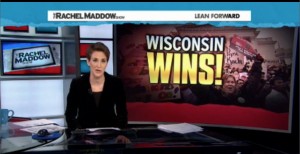Will Team Biden Weaponize Workers’ Pensions?
Big Labor abuse of worker pension and benefit funds as a means of advancing union bosses’ self-aggrandizing policy objectives is a familiar phenomenon.
 Fox All Star and syndicated columnist Charles Krauthammer discusses the meaning of the Wisconsin recall election and how taxpayers have finally had enough of Big Labor’s power and pocketbook grabs while union bosses claimed mythical societal benefits arose from forced-dues:
Fox All Star and syndicated columnist Charles Krauthammer discusses the meaning of the Wisconsin recall election and how taxpayers have finally had enough of Big Labor’s power and pocketbook grabs while union bosses claimed mythical societal benefits arose from forced-dues:
Tuesday, June 5, 2012, will be remembered as the beginning of the long decline of the public-sector union. It will follow, and parallel, the shrinking of private-sector unions, now down to less than 7 percent of American workers. The abject failure of the unions to recall Wisconsin Gov. Scott Walker (R) — the first such failure in U.S. history — marks the Icarus moment of government-union power. Wax wings melted, there’s nowhere to go but down.
The ultimate significance of Walker’s union reforms has been largely misunderstood. At first, the issue was curtailing outrageous union benefits, far beyond those of the ordinary Wisconsin taxpayer. That became a nonissue when the unions quickly realized that trying to defend the indefensible would render them toxic for the real fight to come.
But as the recall campaign progressed, the Democrats stopped talking about bargaining rights. It was a losing issue. Walker was able to make the case that years of corrupt union-politician back-scratching had been bankrupting the state.
The real threat behind all this, however, was that the new law ended automatic government collection of union dues. That was the unexpressed and politically inexpressible issue. That was the reason the unions finally decided to gamble on a high-risk recall.
Without the thumb of the state tilting the scale by coerced collection, union membership became truly voluntary. Result? Newly freed members rushed for the exits. In less than one year, -AFSCME, the second-largest public-sector union in Wisconsin, has lost more than 50 percent of its membership.
It was predictable. In Indiana, where Gov. Mitch Daniels (R) instituted by executive order a similar reform seven years ago, government-worker unions have since lost 91 percent of their dues-paying membership.
So they fought and they lost. Repeatedly. Tuesday was their third and last shot at reversing Walker’s reforms … their Waterloo. Walker defeated their gubernatorial candidate by a wider margin than he had — pre-reform — two years ago.
The unions’ defeat marks a historical inflection point. They set out to make an example of Walker. He succeeded in making an example of them as a classic case of reactionary liberalism. An institution founded to protect its members grew in size, wealth, power and arrogance, thanks to decades of symbiotic deals with bought politicians, to the point where it grossly overreached. A half-century later these unions were exercising essential control of everything from wages to work rules in the running of government — something that, in a system of republican governance, is properly the sovereign province of the citizenry.
Why did the unions lose? Because Norma Rae nostalgia is not enough, and it hardly applied to government workers living better than the average taxpayer who supports them.
Most important, however, because in the end reality prevails. As economist Herb Stein once put it: Something that can’t go on, won’t. These public-sector unions, acting, as FDR had feared, with an inherent conflict of interest regarding their own duties, were devouring the institution they were supposed to serve, rendering state government as economically unsustainable as the collapsing entitlement states of southern Europe.
It couldn’t go on. Now it won’t. All that was missing was a political leader willing to risk his career to make it stop. Because, time being infinite, even the inevitable doesn’t happen on its own.

Big Labor abuse of worker pension and benefit funds as a means of advancing union bosses’ self-aggrandizing policy objectives is a familiar phenomenon.

Leaked CTU Proposals Won’t Do Anything to Improve Schools’ Poor Performance

What impact does handing a union monopoly power to deal with your employer on matters concerning your pay, benefits, and work rules have on your pay?